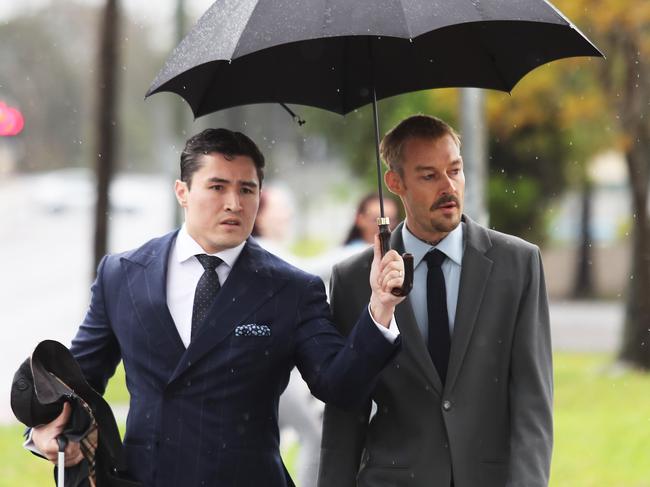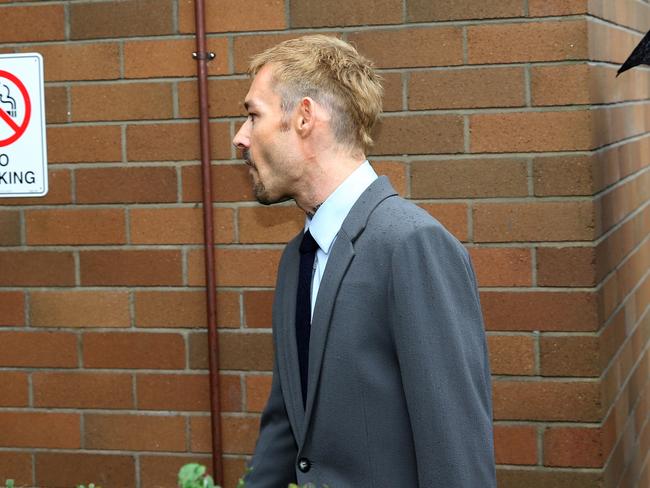Former Silverchair frontman Daniel Johns sentenced over drink-driving after Pacific Highway crash
Former Silverchair frontman Daniel Johns has been sentenced after admitting he was so drunk he drove the wrong way along the Pacific Highway.
Celebrity Life
Don't miss out on the headlines from Celebrity Life. Followed categories will be added to My News.
Rock star Daniel Johns has escaped a full-time jail term after a magistrate found his lifelong mental health battles had contributed to him being so drunk he drove the wrong way along the Pacific Highway, causing a crash which sent a truck rolling and sliding for 100 metres and the former Silverchair frontman to rehab.
Johns, 43, whispered “thank you” after Raymond Terrace Local Court magistrate Ian Cheetham said the musician’s conduct warranted jail time – but ordered that he serve it in the community under an intensive corrections order.
Mr Cheetham sentenced Johns to 10 months’ jail, stating he must accept the supervision of community corrections and continue ongoing treatment as directed.

He was also disqualified from driving for seven months and will have to install an interlock device for 24 months once he regains his licence.
The reclusive rock star had admitted to registering a blood alcohol level of 0.157 after being involved in a crash on the Pacific Highway near Tea Gardens in March.
Police had initially said a 55-year-old woman was injured in the crash, although Mr Cheetham said there was no documents before him which suggested anyone was hurt.
The crash occurred after Johns turned onto the Pacific Highway but drove north on the southbound lanes.
It was Johns’ second drink driving offence after being convicted and fined $880 after registering 0.124 when he was stopped for speeding in suburban Newcastle in 2014.
On the latest charge, Johns had admitted to drinking a bottle of wine and a can of vodka before getting into his car while staying in a holiday home on the mid-north coast on March 23.
Johns‘ solicitor Bryan Wrench said his client had been “self-medicating” with alcohol as he struggled with his mental health as the launch of a new album approached.
“He was self-medicating, the fact [is this] was the only way he could deal with these issues – there was no issue with drugs, just alcohol,” Mr Wrench told the court.
The solicitor later added: ”He does not want to consume alcohol, he does not want to be that person”.

Mr Wrench said Johns had struggled with his fame from his early teens, with his mental health issues exacerbated by being in the spotlight.
It included the darker side of being famous, including “vitriol” from the general public and had made the 43-year-old a recluse who rarely left the safety of his own home.
Mr Wrench said Johns had suffered from a range of health issues during his life, including anorexia in his mid-20s which left him “almost on his death bed”, related severe arthritis and was suffering stress, anxiety and vomiting in the lead-up to the crash.
But Mr Wrench said Johns had taken the incident and subsequent charge “very seriously”, had booked himself into rehab after the crash and had not attended any “in-person” functions for his new album because he did not wish to disrespect the court.
He tendered letters from Johns’ mother and brother, who had never given a ”public statement” in the past, about their relative’s troubled life.
”He is [now] the real Daniel Johns that they love and have grown up to love and he is back home today,” Mr Wrench said.

Mr Cheetham agreed with prosecutors that Johns’ actions had “crossed the threshold” to warrant a term of imprisonment.
But the magistrate detailed a report about Johns’ life, including that he was a “deeply troubled person” with a background of childhood trauma.
Mr Cheetham listed a range of Johns’ health complaints, including him suffering from chronic post traumatic stress disorder, an alcohol disorder, a pain disorder and eating disorders.
He said Johns had needed to escape his “anxiety” when he drove drunk.
Mr Cheetham said although the incident was “very serious” and warranted jail, he believed Johns and the community would be better served if the term of imprisonment was in the form of the intensive corrections order.
“Thank you, Mr Johns. I wish you well,” Mr Cheetham said.
Johns replied: “Thank you.”



